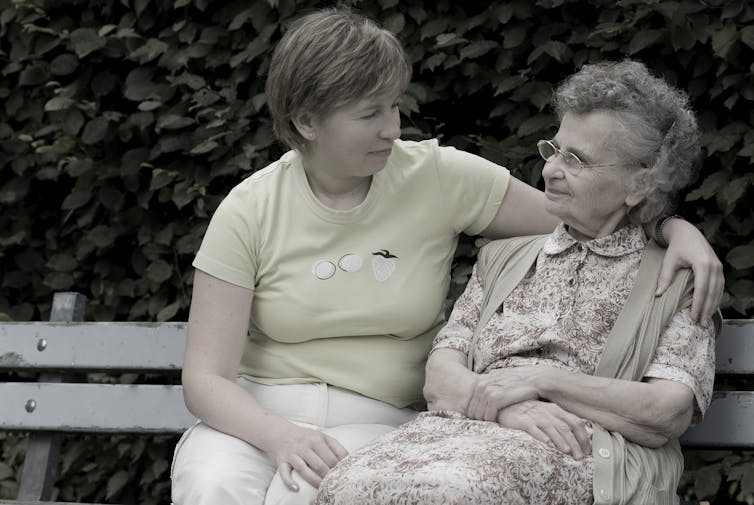Looking after a dying loved one at home? Here's what you need to know
- Written by Liz Forbat, Professor of Palliative Care, Australian Catholic University
This article is part of our series on demystifying palliative care, where experts explain the process of end-of-life care in Australia.
When someone dies at home, everyone in the family is affected. Looking after a relative who is at the end of their life can be enormously rewarding, but carers have many unmet information and support needs. This can take a toll on their physical and emotional health.
Here are some tips if you are looking after someone nearing the end of their life.
1. Look after yourself
Carers looking after someone with a life-threatening illness have higher levels of emotional distress, including depression and anxiety, than the general population. It’s important you look after yourself.
Self-care might mean finding time to take a break from caring by signing up for yoga classes where calming breathing techniques are practised, or seeking counselling or support groups.
Read more: How to get your stress levels in check
Caring can be very rewarding for both the carer and the patient. Research shows caring can make people feel closer to those they’re caring for. Carers often feel proud that they have been able to look after someone in their last years, months or days of life.
It can be a positive experience to think about the rewards of caring, like spending more time together or knowing you’re making a difference to a loved one at a difficult time.
 It’s important you look after yourself.
It’s important you look after yourself.
2. Get informed
Caring for a relative at the end of life is likely a new experience. Many carers are learning on the job and often don’t feel practically or emotionally prepared for the task. Research consistently shows carers want to know how to safely carry out practical caring tasks, like moving the person in and out of bed, preparing suitable meals, and giving medication.
Emotional tasks might include listening to the patient’s worries and helping the patient write down their preferences for care and treatments in an advance care plan. When patients have an advance care plan, carers report less stress because key decisions have already been made and documented.
Read more: What you need to know about advance care directives
Palliative care services often have support groups or information sessions, which help carers feel more prepared and better informed. Such groups help meet carers’ information needs. They also increase self-efficacy (the belief of being able to personally succeed in caring tasks).
Recently, distance learning has been offered to carers and evidence shows this helps them feel more prepared to carry out their duties.
 A carer’s emotional tasks might include listening to the patient’s worries.
from shutterstock.com
A carer’s emotional tasks might include listening to the patient’s worries.
from shutterstock.com
3. Ask for help
Many current approaches to supporting people nearing the end of life involve working with whole communities. Known as compassionate communities, these approaches are based on the concept it is not just up to an individual carer, or the health service, to look after people approaching the end of life. Support can be everyone’s responsibility, from pharmacists, librarians and teachers to employers and colleagues.
Apps, such as Care For Me, and websites can help co-ordinate help from friends, family and the community. The website Gather My Crew offers a way for carers to list tasks they need help with, to take some of the pressure off themselves.
4. Talk about it
When someone is critically ill or dying, family members often decide not to share their worries with each other. Psychologists call this protective buffering. People do it to try to protect their family and friends from worrying more.
Although it is well-intended, protective buffering can make people feel less close. It’s OK to share worries with each other. Being able to talk about feelings means being able to deal together with the difficult things like pain or fear.
 Talk about your anxieties.
from shutterstock.com
Talk about your anxieties.
from shutterstock.com
Using the “d” words (death and dying) can be difficult, and is an outright taboo in many cultures. Find language that suits you: be direct (death), or use metaphors (pass away) or less direct phrases (getting sicker) so that you can talk about worries together.
Read more: Passed away, kicked the bucket, pushing up daisies – the many ways we don’t talk about death
5. It’s OK to think about the future
It’s hard to balance feeling positive and feeling sad about the person approaching the end of their life. Many family members and carers say they feel guilty for thinking about the future or making plans for after the person has died.
But research in bereavement has shown it’s normal and healthy to move between focusing on the here and now, and on the life after the caring role ends. This might be reassuring if you’re the kind of person who doesn’t always want to face emotions head on – distracting yourself by thinking about the future is actually a natural and healthy thing to do.
Read other articles in the series:
Authors: Liz Forbat, Professor of Palliative Care, Australian Catholic University
Read more http://theconversation.com/looking-after-a-dying-loved-one-at-home-heres-what-you-need-to-know-83499





